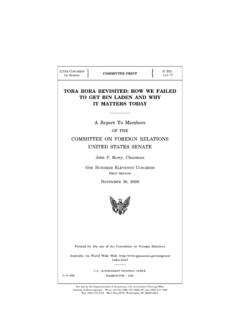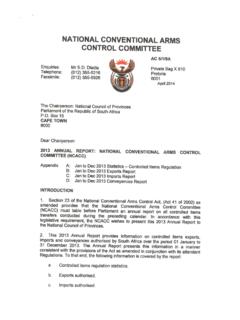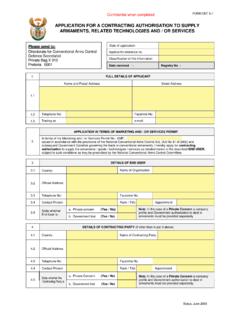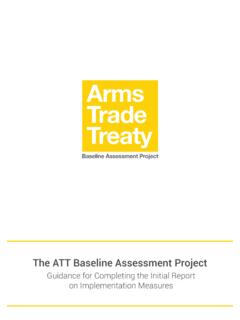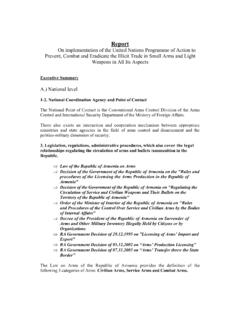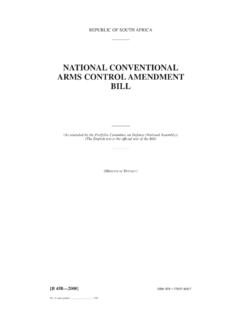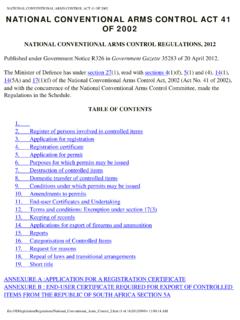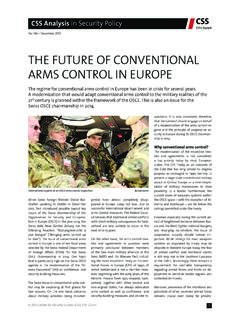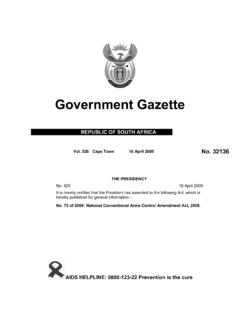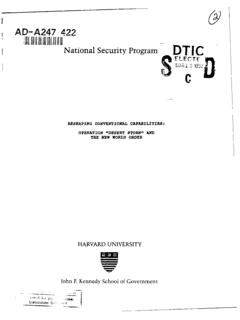Transcription of Andrea Thompson Under Secretary of State for Arms Control ...
1 UNCLASSIFIED PREDECISIONAL AND DELIBERATIVE UNCLASSIFIED PREDECISIONAL AND DELIBERATIVE Andrea Thompson Under Secretary of State for arms Control and International Security Statement for the Record Testimony before the Senate Committee on Foreign Relations NOTIONAL The State of arms Control with Russia September 18, 2018 Chairman Corker, Ranking Member Menendez, and distinguished members of the Committee: thank you for hosting this hearing and welcoming me here today. The subject of this hearing the State of arms Control with Russia is of critical importance to and allied national securit y, and a timely issue to discuss with the Committee today.
2 The 2018 Nuclear Posture Review states, progress in arms Control is not an end in and of itself, and depends on the security environment and the participation of willing partners. The value of any agreement is derived from our treaty partners maintaining compliance wit h their obligations, and avoiding actions that result in mistrust and the potential for miscalculation. Russia continues to violate a series of arms Control obligations that undermine the trust the United States can place in treaties, including some that have served and allied security interests for years. We seek to utilize a strong military deterrent in combination with arms Control to maintain strategic stability wit h Russia.
3 arms Control measures have benefited the United States by providing mutual transparency and predictability, constraining certain weapons of immense destructive potential in the Russian arsenal, and enhancing strategic stability. The Department of Defense concluded in the national Defense Strategy, and as reflected in the Trump Administration s national Security Strategy, that great power competition is reemerging. We need to be creative and flexible in how we approach and manage our strategic compet it ion with Russia, and that includes an evaluation of where we stand with respect to our arms Control agreements, and their interrelationship with our deterrence and defense requirements.
4 As you know, Russia has taken actions over the past few years that have posed real challenges to our bilateral relat ionship and widened the deficit of trust we have with Russia. Russia has used chemical weapons in the United Kingdom and tacitly approved of the Assad regime s abhorrent use of chemical weapons against its own people even while protecting that regime from accountability for these atrocit ies. It has also violated its obligations Under the INF Treaty and undertaken aggressive actions in outer space while proposing agreements to constrain others. Russia s response to each of these situations is to emplo y its standard playbook of distraction, misinformation, and counter-accusations.
5 It has sought to blame the United Kingdom and other European countries for the Salisbury incident and supported Syrian claims alternatively blaming terrorists, Turkey, and the United States for Assad s years of chemical weapons use. Similarly, Russia has falsely accused the United States of not complying with the INF Treaty in order to distract from its own INF vio lat ion. The Trump Administration has challenged Russia s systematic misconduct a number of ways. However, it remains in our interest to maintain strategic stability with Russia, and continue arms Control agreements that meet and allied national interests. UNCLASSIFIED PREDECISIONAL AND DELIBERATIVE 2 UNCLASSIFIED PREDECISIONAL AND DELIBERATIVE I will briefly touch on a few key issues in our arms Control relationship with Russia, and will close with a few remarks regarding the Department s implementation of Section 231 of the Countering America s Adversaries Through Sanctions Act of 2017.
6 Strategic arms Control : New START and INF Treaty I will start with the New START Treaty. The United States will continue to implement the New START Treaty and verify Russian compliance. We benefit from the Treaty s 18 annual on-site inspections of strategic nuclear warheads and delivery systems, bases, and infrastructure; the comprehensive biannual data exchanges which record the disposition and numbers of intercontinental ballistic missiles (ICBMs), submarine-launched ballistic missiles (SLBMs), and heavy bombers; and, the almost 16,000 notifications we have exchanged over the life of the Treaty which give us a good idea of where these nuclear weapons are at a given moment in time.
7 The types of weapons that are accountable and limited Under New START make up the gross majority of Russia s current and foreseeable strategic nuclear arsenal. We are committed to implementing the Treaty and ensuring Russia stays in compliance. In February of this year, both countries confirmed compliance with the Treaty s central limits on ICBMs, SLBMs, and heavy bombers and their associated warheads. I know this Committee has sought the Trump Administration s view of extending the Treaty. A decision has not been made at this time. Among issues to consider will be Russia s decision to manufacture compliance issues regarding weapons, and the uncertainty of whether or not Russia s recently announced strategic nuclear weapons will be held accountable Under the Treaty.
8 Any decision on New START will take into context Russia s stance on these issues, its behavior in other arms Control agreements, and the security needs of the United States and its allies. And it goes without saying: Russia s continued compliance with New START is a requirement for any potential extension of the Treaty. Meanwhile, Russia has persisted in its violation of the INF Treaty through Russia s SSC-8 ground-launched cruise missile program. The Trump Administration has utilized diplomatic, military, and economic measures to pressure Russia to return to compliance. On the diplo mat ic front, the Administration has sought dialogue with Russia, both at the expert level in the Special Verification Commission, the implementation body for the Treaty, and in bilateral formats, as well as raising the issue at the political level.
9 We have worked closely with our allies and partners in Europe and in Asia to raise the profile of Russia s violation and continued non-compliance. In the area of military responses, the Department of Defense continues to pursue Treaty-compliant research and development on a ground-based missile system that, if completed, would be noncompliant with INF. This system is designed to be a direct counter to Russia, and the United States has made it clear that we will cease pursuing its development if Russia returns to compliance with the Treaty. On the economic line of effort, the Administration added two ent it ies involved in the SSC-8 s development and production, Novator Design Bureau and Titan Central Design Bureau, to the Department of Commerce Entity List in December 2017.
10 This action imposes a license requirement for the export, re-export, or transfer of any items subject to the Export Administration Regulat ions (EAR) to these entit ies. Any such license applications will be reviewed with a policy of presumption of denial. This prior review will enhance the UNCLASSIFIED PREDECISIONAL AND DELIBERATIVE 3 UNCLASSIFIED PREDECISIONAL AND DELIBERATIVE ability to prevent the use of items subject to the EAR contrary to national security or foreign policy interests. The lack of any meaningful steps by Russia to return to compliance diminishes our hope that Russia has any interest in preserving the INF Treaty, despite Moscow s public statements to the contrary.




